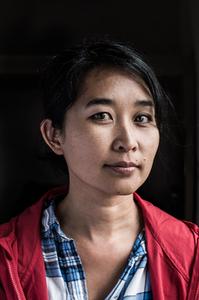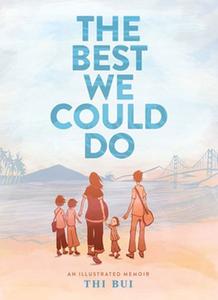
|
|
| photo: Gabe Clark | |
Thi Bui and her family arrived in the U.S. as refugees from Vietnam. After studying art and law and considering a career as a civil rights lawyer, she taught public school in New York City and was a founding teacher of the Oakland International High School, the first public high school in California for recent immigrants and English learners. She currently teaches in the MFA in Comics program at the California College of the Arts and lives in Berkeley with her family.
Her debut graphic memoir, The Best We Could Do (Abrams ComicArts), tells the story of her family's escape after the fall of South Vietnam in the 1970s and the difficulties they faced building new lives for themselves. Newsweek called it "one of the books that will make 2017 interesting," and it's a Barnes & Noble Discover Great New Writers selection for spring 2017.
While writing The Best We Could Do, you wanted to quit numerous times. What made you keep going?
Haha, it was that I had successfully created a trap for myself. By telling so many people that I was working on this book, and sharing the process of it all along the way, I made it impossible to quit.
How did the idea of presenting it as graphic memoir come to you?
I read Maus by Art Spiegelman and Persepolis by Marjane Satrapi. And Blankets by Craig Thompson. Before that, I didn't know that comics were a medium that would work well for this kind of story. Since then, I've discovered many other amazing stories told through comics. Yoshihiro Tatsumi, Taiyo Matsumoto, Sarah Glidden, Eleanor Davis, Pat Grant, Bastien Vives and Gipi are some of the cartoonists whose storytelling I really admire. But those three big books [by Spiegelman, Satrapi, and Thompson] made it into the mainstream where I could find them without knowing a lot about comics.
When I was younger, I had tried with very little success to get at similar content through drawing and sculpture, and a little more successfully through shadow puppetry. I turned a corner when I approached it as an oral history project. But the story finally found a happy home in the form of a graphic memoir.
You say in the book "it took a long time to learn the right questions to ask" your parents about their past. What were the right questions?
My parents have actually always talked about the past. I knew a lot of stories just from living with them. It was more a question of growing up and growing enough empathy to be able to listen to them more carefully. And the process of trying to piece it all together into a coherent narrative helped me see how much I didn't know. I'd constantly have to go read more history and then go back and ask more informed questions. Trying to envision the stories enough to draw them, and really trying to put myself in their shoes, got me thinking and asking questions in a way that fleshed out the words and deepened my understanding of my parents' lives.
Have they seen the finished book? What were their reactions?
They've both read the finished book. They read rough drafts of each chapter as I drew them, and often gave me feedback or more information that I incorporated into the next draft. On sensitive parts, I like to think they always had veto power. They like to think that I told the story the way I saw it. That's fair. They don’t really tell me directly what they think of it, but I've heard them telling other people about it, so I think they're proud of it.  How do they feel about their personal stories being made public?
How do they feel about their personal stories being made public?
Things like this are a bit personal for them, and they've been very generous to let me portray them as whole human beings, meaning not perfect. There's plenty I don't tell about them out of respect for their privacy. I think they see themselves as part of a greater diaspora, and they support Vietnamese stories getting told. My mom is telling all her friends to buy the book.
She recently came with me to hear [Pulitzer-winning author] Viet Thanh Nguyen talk about his nonfiction book, Nothing Ever Dies, at UC Berkeley. Afterwards she told him that she loves his work and that she thinks it's very important, even if it might be too radical for some people of her generation. She said it's not too radical for her, because she has her kids, like me, chipping away at her. It's only through occasionally hearing my mom talk about me to other people like this that I have any idea what she thinks of me!
Refugee children aren't often encouraged to go into the arts. How did your parents feel when you moved to New York City to be an artist?
I'm lucky to have two older sisters, one who went to medical school and another who went to law school. I'm a lot younger than they are, so by the time it was my turn to be a teenager, my parents were so tired and broken into the challenges of raising kids in America that they didn't put too many demands on me. My mom just wanted to make sure I went to college. My dad really wanted me to be an artist.
Why?
My father had artistic aspirations, too. He drew a lot when he was younger. He used to write poetry and published it in Vietnamese-language papers and magazines like Làng Văn. I don't remember him being a very practical person about money and career choices. My mother was the breadwinner after we immigrated.
You refer to the "ability to run when the sh*t hits the fan" as "refugee reflex." Do you still have that reflex? If not, at what point did you feel it was no longer necessary?
I did a lot of work on myself over the course of writing this book. I think in moments of crisis, my fight-or-flight reflex is still very strong. But instead of running, which is good for self-preservation, I'm hanging onto the notions of community that I've formed from so many years of teaching and nonprofit work, and the stronger sense of myself that just comes with getting older and better. So now I'm more interested in fighting.
What are your thoughts on the current refugee crisis and immigration ban?
The travel ban on people from targeted countries is horrible and has nothing to do with national security. People going through the immigration process are so vulnerable already. Their lives hang on being granted the proper paperwork. A piece of paper with a stamp on it. For our government to rip away the assurances promised to them, without warning or reason, is miserably cruel and petty.
You expressed a hope for your son to be free of the weight of the past. How do you help him get there? What will you say when he reads this book and has questions about his family history?
My son recently read the book. He's 11 now. He grew up around me drawing it, so he's gotten the stories in pieces over the years anyway. I don't shield him from history. We have had many long conversations about history in which he asked all the questions he wanted to, and I did my best to explain or lead him to books and movies that could give him more than I could tell him.
It's more the emotional and psychological scars of our family history that I would like him to be free of, you know? The irrational fears or odd behavior that survivors often have. I'd like him to be free of those. He's a pretty joyful child, and it gives me joy to see that.
What do you hope other refugees will take away from your book?
I'm not sure I have any wisdom to offer other refugees, who went through the same things or much worse. The best I can offer them is a mirror for their experiences and perspectives. To say I am here, and that acknowledges that you, too, are here and part of this country. You deserve to have stories that acknowledge you. --Elyse Dinh-McCrillis, blogger at Pop Culture Nerd

